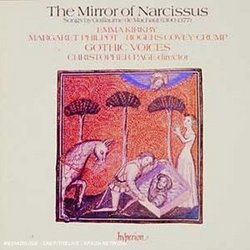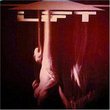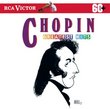| All Artists: Peter McCrae, Colin Scott Mason, Guillaume de Machaut, Christopher Page, Gothic Voices, Emily van Evera, Emma Kirkby, Andrew King, Rogers Covey-Crump Title: The Mirror of Narcissus - Secular Songs by Guillaume de Machaut Members Wishing: 0 Total Copies: 0 Label: Hyperion UK Release Date: 11/11/1993 Album Type: Import Genres: Pop, Classical Styles: Vocal Pop, Opera & Classical Vocal, Forms & Genres, Ballads, Rondos, Historical Periods, Early Music Number of Discs: 1 SwapaCD Credits: 1 UPC: 034571160870 |
Search - Peter McCrae, Colin Scott Mason, Guillaume de Machaut :: The Mirror of Narcissus - Secular Songs by Guillaume de Machaut
 | Peter McCrae, Colin Scott Mason, Guillaume de Machaut The Mirror of Narcissus - Secular Songs by Guillaume de Machaut Genres: Pop, Classical
The second Gothic Voices recording was something of a milestone: the first recording of 14-century music performed by voices alone. The absence of instruments permits very precise tuning (no small matter in this repertor... more » |
Larger Image |
CD DetailsSynopsis
Amazon.com The second Gothic Voices recording was something of a milestone: the first recording of 14-century music performed by voices alone. The absence of instruments permits very precise tuning (no small matter in this repertory) and doesn't obscure Machaut's poetry (which was admired by no less than Geoffrey Chaucer). Belying its scholarly-but-dull reputation, Gothic Voices sings with plenty of energy and rhythmic snap; the monophonic songs, performed by a single unaccompanied voice, come off particularly well. The best example of this disc's achievement is the famous "Douce dame jolie," which has been done as everything from a catchy little ditty to a fife-and-drum march: Margaret Philpot performs it as what it is--the forlorn plea of a spurned lover. --Matthew Westphal Similar CDs
|
CD ReviewsThey just don't write songs like this anymore! Nelson R. Willis | Pittsburgh, PA | 11/07/1999 (5 out of 5 stars) "Guillaume de Machaut was a very interesting figure. He was born around 1300 and lived to be quite old, especially considering that life expectancies were much shorter then than now. And even though there were no sound recordings at the time, there was written music for those who could afford to study music. In his old age Machaut was saught out by a groopie of sorts. A young woman came to admire him when she learned some of his music. The two met in person and actually had a relationship for a while. Enough gossip, though. Guillaume de Machaut wrote some of the finest medieval music I've ever heard. Indeed, he wrote some of the finest music I've ever heard, period. This album is so beautiful; it takes you to a place that one might mistake for heaven. You will think that you are listening to angels singing in French when you hear it. The entire album is _a capella_; that is to say that the only instruments you will hear are human voices. Some of the tracks such as "Foy Porter," and "Tuit Mi Penser" are monophonic; that is to say that only one voice is present, sometimes male, sometimes female. These monophonic songs are extrememly pretty; they have very pleasing and interesting melodies and rhythms -- just as sophisticated as anything one might hear in later periods, but different in style both compositionally and in terms of performance. The singing on this album is world-class. The singing style and technique is very interesting and pleasing to the ear. The range of pitches is pretty wide, yet even the higher registers are smooth and natural, not overwhelming or grating like some opera sopranos can be at times.The best material on the album, though, is polyphonic; that is music with several voices which create harmonies and counterpoint. There are four- and five-part harmonies that are out of this world, mixing male and female voices in a manner one might describe as an otherworldly, Francophonic, medieval barber shop quartet/quintet. If the Beach Boys had grown up in 14th-century France, they would have been performing music like this. "Dame, Je Sui Cilz/Fins Cuers Doulz," and "Dame, Mon Cuer En Vous Remaint" are two such songs, and my personal favorite is "Dame, DE Qui Toute Ma Joie Vient." The counterpoint and counterrhythms are as sophisticated and impressive as the harmonies. It's really quite stunning, ethereal, beautiful music. If you like early music, you will love this. If you are not yet familiar with much early music, this album would be a wonderful introduction." Unmatched Machaut Giordano Bruno | Wherever I am, I am. | 04/30/2007 (5 out of 5 stars) "I'd forgotten this disk in a corner of my collection until I heard an concert by another group, Liber UnUsualis. I reviewed their CD "Unrequited" quite enthusiastically, but then I searched for "The Mirror of Narcissus" and listened to the two head-to-head. Results: both good, but "The Mirror" is more intense, more passionate, and more artful in articulating the hockets and other effects of Ars Nova heterophony. If Gothic Voices ever had a reputation of being "academic but dull", that was a bad rap. This performance is fiery." Great musicianship and purity of tone S. Jacobson | Portland OR | 01/28/2006 (5 out of 5 stars) "This is one of my favorite early music CDs and perhaps my favorite Machaut CD. Wonderful material, intelligently presented, sung by gorgeous voices with perfect pitch control. Groups like Gothic Voices are sometimes criticized for being too perfect (i.e., real medieval musicians wouldn't have been this good and/or polished), but to my ears this is wonderful stuff. Highly recommended."
|

 Track Listings (13) - Disc #1
Track Listings (13) - Disc #1


